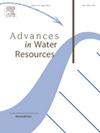Modeling parametric uncertainty in PDEs models via Physics-Informed Neural Networks
IF 4
2区 环境科学与生态学
Q1 WATER RESOURCES
引用次数: 0
Abstract
We provide an approach enabling us to employ physics-informed neural networks (PINNs) to propagate parametric uncertainty to model outputs. Our approach is applicable to systems where observations are scarce (or even lacking), these being typical situations associated with subsurface water bodies. Our physics-informed neural network under uncertainty (PINN-UU) integrates the space–time domain across which processes take place and uncertain parameter spaces within a unique computational domain. PINN-UU is then trained to satisfy the relevant physical principles (e.g., mass conservation) in the defined input domain. We employ a stage training approach via transfer learning to accommodate high-dimensional solution spaces. We demonstrate the effectiveness of PINN-UU in a scenario associated with reactive transport in porous media, showcasing its reliability, efficiency, and applicability to sensitivity analysis. PINN-UU emerges as a promising tool for robust uncertainty quantification, with broad applicability to groundwater systems. As such, it can be considered as a valuable alternative to traditional methods such as multi-realization Monte Carlo simulations based on direct solvers or black-box surrogate models.
基于物理信息神经网络的PDEs模型参数不确定性建模
我们提供了一种方法,使我们能够使用物理信息神经网络(pinn)将参数不确定性传播到模型输出。我们的方法适用于观测很少(甚至缺乏)的系统,这些是与地下水体相关的典型情况。我们在不确定性下的物理信息神经网络(PINN-UU)集成了过程发生的时空域和独特计算域内的不确定参数空间。然后训练pin - uu在定义的输入域中满足相关的物理原理(例如,质量守恒)。我们通过迁移学习采用阶段训练方法来适应高维解空间。我们证明了pin - uu在多孔介质中反应输运相关场景中的有效性,展示了其可靠性、效率和敏感性分析的适用性。PINN-UU是一种很有前途的鲁棒不确定性量化工具,对地下水系统具有广泛的适用性。因此,它可以被认为是传统方法(如基于直接求解器或黑盒代理模型的多实现蒙特卡罗模拟)的有价值的替代方法。
本文章由计算机程序翻译,如有差异,请以英文原文为准。
求助全文
约1分钟内获得全文
求助全文
来源期刊

Advances in Water Resources
环境科学-水资源
CiteScore
9.40
自引率
6.40%
发文量
171
审稿时长
36 days
期刊介绍:
Advances in Water Resources provides a forum for the presentation of fundamental scientific advances in the understanding of water resources systems. The scope of Advances in Water Resources includes any combination of theoretical, computational, and experimental approaches used to advance fundamental understanding of surface or subsurface water resources systems or the interaction of these systems with the atmosphere, geosphere, biosphere, and human societies. Manuscripts involving case studies that do not attempt to reach broader conclusions, research on engineering design, applied hydraulics, or water quality and treatment, as well as applications of existing knowledge that do not advance fundamental understanding of hydrological processes, are not appropriate for Advances in Water Resources.
Examples of appropriate topical areas that will be considered include the following:
• Surface and subsurface hydrology
• Hydrometeorology
• Environmental fluid dynamics
• Ecohydrology and ecohydrodynamics
• Multiphase transport phenomena in porous media
• Fluid flow and species transport and reaction processes
 求助内容:
求助内容: 应助结果提醒方式:
应助结果提醒方式:


